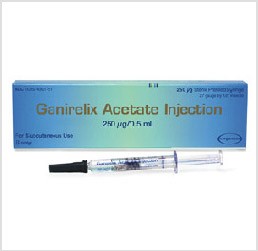With both ganirelix cost and Cetrotide costs placing them on the higher end of the spectrum where fertility medications are concerned, many women are left wondering whether one is better than the other for producing a response. Both fertility drugs are GnRH antagonists that suppress follicle stimulating hormones (LH and FSH). The intended effect is to suppress or delay ovulation which allows eggs to mature longer in the ovaries before they are released. With ganirelix IVF treatments and protocols, this is desirable so that the eggs will not be released before collection. The differences between the two fertility medications, is, as they say, in the details.
The Differences Between Ganirelix Acetate IVF Medications and Cetrotide
Ganirelix acetate IVF use begins with the injection of the GnRH antagonist (Ganirelix) in order to suppress the LH until such a time as the follicles are mature. The FSH is then administered to stimulate the follicles to produce eggs. HCG is then introduced to the woman’s system so that the eggs will mature and be ready for retrieval in an IVF procedure.
Ganirelix Side Effects versus Cetrotide Side Effects
Ganirelix side effects, as well as Cetrotide side effects, are similar in nature. Both can cause headaches and mild nausea, which are the most common side effects. These symptoms often go away over time. More serious side effects can happen to those who have allergic reactions. If an allergic reaction occurs, a patient should call their doctor and seek help immediately.
Ganirelix IVF treatments and protocols are run similarly to Cetrotide treatments with IVF. The main difference that one would be prescribed over another may have more to do with insurance coverages, a woman’s unique chemistry, and other medications that she may be currently taking. Many women have had success finding ganirelix coupons online, cutting their ganirelix costs significantly.
Ganirelix Acetate IVF Prescriptions Higher than Centrotide
Lupron used to be the go-to medication for this suppression process, but with the development of both Ganirelix acetate ivf and Centrotide, whose success rates were significantly higher, Lupron fell out of favor. It is still utilized by some doctors when protocols require it due to a woman’s inability to tolerate Ganirelix or Cetrotide. While there is no clinical data which suggests that one is any better than the other where chances for pregnancy are concerned, both Ganirelix and Cetrotide tend to be prescribed over Lupron, with Ganirelix having a slightly higher prescription rate.


